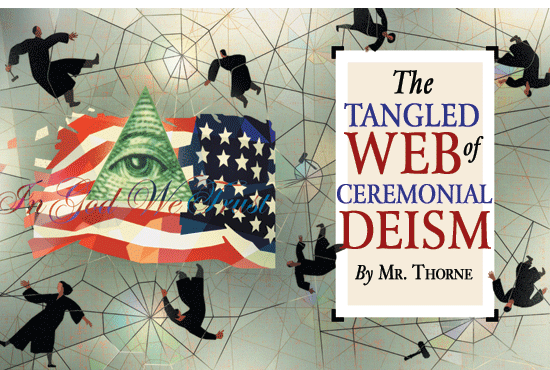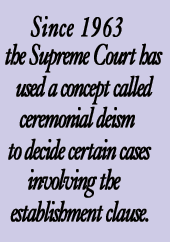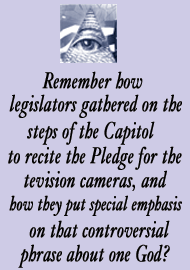The Tangled Web of Ceremonial Deism
M. Thorne September/October 2003
Getting your Trinity Audio player ready...

Illustrations by Mick Wiggins

Remember last June? For some a time of infamy. For others a brave judicial finding. Three judges of the Ninth Circuit Court of Appeals in San Francisco ruled that the phrase "under God" in the Pledge of Allegiance endorses a religious belief; that when the U.S. Congress added the phrase to the Pledge back in the mid-1950s, it violated the First Amendment to the Constitution; and that the addition of that
phrase to the Pledge amounts to nothing less than official government endorsement of a particular religious belief.
Remember how members of the Congress swiftly, almost unanimously, condemned the ruling of those three judges? Remember how both the House and the Senate passed resolutions in support of the Pledge? Remember how legislators gathered on the steps of the Capitol to recite the Pledge for the television cameras, and how they put special emphasis on that controversial phrase about one God?

Senator Robert Byrd, who was a member of Congress when the phrase was added to the Pledge back in the 1950s, said of the judge who wrote the ruling, "Stupid, that's what he is." Other U.S. senators said the ruling was "crazy, outrageous, nuts." Senator Trent Lott said the ruling was "bizarre," and he introduced a constitutional amendment to keep the phrase in the Pledge. There was talk of breaking up that court—one said to have a history of bizarre rulings—since it had gone just too far this time. President Bush called the ruling "ridiculous." He said it was a "fact" that our rights came from one God, that only those who believed in one God would be considered for appointment to the bench (perhaps putting the president on the wrong side of Article VI of the Constitution, which says that "no religious test shall ever be required as a qualification to any office or public trust under the United States").
Religious leaders and conservative commentators rallied the faithful; they noted just how unfair it was that some liberal judges could side with one aggressive atheist and wreak such havoc on the basic fabric of American life. Pat Robertson called the ruling "outrageous," and Jerry Falwell said it was "appalling." Good citizens called radio talk shows to express their dismay and disgust; they wrote letters to Congress and the editors of newspapers. A few of them even took the time to get the phone number of that atheist who brought the case to the court. Some left death threats on his answering machine.
You remember all that, don't you? Obscure constitutional scholars wound up on TV and assured us all that the controversial ruling was nothing to worry about; that it wouldn't hold; that if those loony liberal judges in San Francisco held to this madness, then the Supreme Court would surely set things straight. This was America, a country founded by Christians for Christians, a country devoted to, and blessed by, the God of the Pledge, a country that put its trust in that God; and no atheist was going to get away with this affront to the sensibilities of good God-fearing Americans. And the timing of it: just nine months after some fanatic Muslims attacked us right here at home, just one week before the Fourth of July.
The court stayed its ruling and put it on hold until it could be reviewed by the entire court. This past February the entire court reaffirmed the ruling and declined a request from the U.S. Justice Department to reconsider. What happens next? The Elk Grove school district (where the atheist's daughter attended school and was subjected to listening to other students recite the Pledge) plans to appeal the ruling to the Supreme Court. If it does, will the nation's highest court consider the matter? Maybe, maybe not. The Supreme Court declined to hear an appeal on this very issue in 1993. But if the matter is considered by the Supreme Court, what might happen?
Since 1940 the U.S. Supreme Court has twice ruled on laws that require public school students to recite the Pledge of Allegiance, and it has discussed the Pledge in a number of other cases—cases that bear on whether adding "under God" to it in 1954 violated the establishment clause. See "Supreme Court Decisions Involving the Pledge of Allegiance" for a history of those cases.
The issue first came before the lower courts in 1918, 25 years after the Pledge was introduced. A schoolgirl in Ohio was sent home from school after she refused to recite the Pledge. She was a Mennonite, and she had been taught not to say the Pledge. Her father, Ora Troyer, was charged with and convicted for instructing his daughter to go against the law. He was fined and jailed for a month. He appealed to the Ohio Supreme Court, which upheld the conviction. Since then the Pledge has been the central topic in a number of lower court rulings.
Ceremonial Deism
Since 1963 the Supreme Court has used a concept called ceremonial deism to decide certain cases involving the establishment clause. If a practice
is customary, then even if it amounts to government en-
dorsement of a particular religion or religious belief, it may be beyond the reach of the establishment clause.

Christmas is a good example of ceremonial deism. The holiday has been celebrated by so many for so long that it's no endorsement of Christianity for it to be a national holiday. A Christmas tree is an instance of ceremonial deism, and it's no endorsement of Christianity to spend public funds to erect one at the White House. It wouldn't matter even if only Christians put up Christmas trees. The tradition has been with us so long that it is an American tradition; it lacks religious significance, according to the Court.
Ditto for "under God" in the Pledge and "In God We Trust" on our money. According to one justice of the Supreme Court, these instances of ceremonial deism are "protected from establishment clause scrutiny chiefly because they have lost through rote repetition any significant religious content."
The term ceremonial deism was introduced in 1962 by Eugene Rostow, the dean of Yale Law School. He used the term to refer to practices that are "so conventional and uncontroversial as to be constitutional." In Rostow's phrase deism refers to belief in a singular god. But the term has a more specific meaning. It refers to a belief held by a good number of the founders of America, the belief that there is one god, that it created the universe and the laws of nature and life, but that it does not interfere with its creation: it merely observes what happens. There are no miracles. There are no divine interventions or revelations. The god of the deists is not the God of Jerry Falwell or Pat Robertson.
In the United States there are more than 4 million Presbyterians who believe in Jesus and more than 4 million Jews who don't. Jesus is controversial. There are more than 63 million Catholics that believe God is a Trinity and almost 3 million Muslims that believe God is One. The nature of God is controversial. There are some 3 million atheists who don't believe there is a God, and another 6 million agnostics who don't know. The existence of God is controversial. There are millions of Americans—mostly Buddhists and Hindus—who believe that there is more than one God.
There are all sorts of religious beliefs. They're inherently controversial. That there is only one God is a controversial proposition, no matter how popular it is.
Well, maybe this case will never make it to the Supreme Court. Perhaps an effort to get our national slogan, "In God We Trust," posted in every public building and every public school classroom will be the one that gets the Court to address the constitutionality of the government's endorsement of monotheism. The American Family Association, a conservative Christian group in Mississippi that sells posters bearing our national slogan, has been heading the effort. So far, it's gotten a number of states to pass laws requiring the posting of the posters in public schools. There is now a bill making its way through the Colorado legislature that requires that the posters be put up in each and every classroom. It says that any taxpayer in Colorado can file suit if he/she discovers a public building or classroom without the slogan. And the United States Postal Service is going to be putting up its own posters bearing the national slogan in each of its more than 38,000 branches.
The Supreme Court has yet to hear a case challenging the constitutionality of the national motto. But the issue has made it as far as an appeals court. In 1970 an appeals court ruled that "it is quite obvious that the national motto and the slogan on coinage and currency, 'In God We Trust,' has nothing whatsoever to do with the establishment of religion. Its use is of a patriotic or ceremonial character and bears no true resemblance to a governmental sponsorship of a religious exercise." Which appeals court? Why, Ninth Circuit Court in San Francisco, the same one that ruled last June that "under God" in the Pledge violates the establishment clause. .
